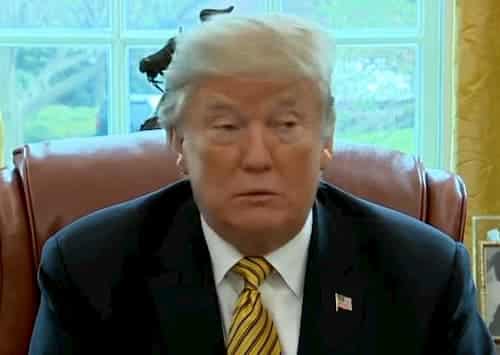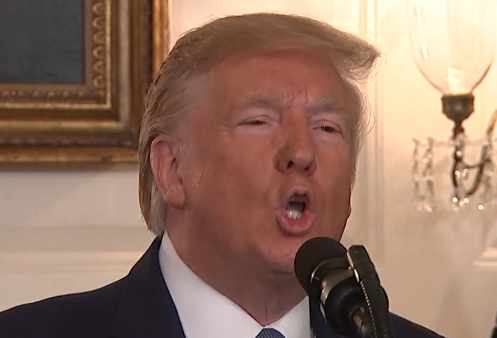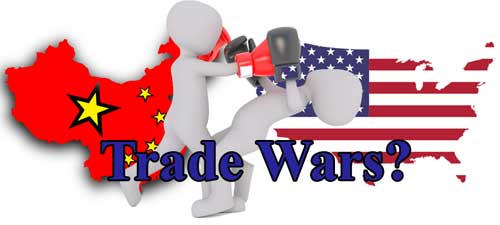WHITE HOUSE/WASHINGTON — U.S. President Donald Trump is denying trade talks with China have collapsed and is characterizing what many are calling a trade war between the world’s two largest economies as “a little squabble.”
“We have a dialogue going. It’ll always continue,” Trump said in response to a question Tuesday from VOA on the White House south lawn. “We had a deal that was very close and they broke it.”
As a result, administration officials say the president this week decided to deepen what they bluntly characterize as a trade war with China.
“Nobody wins a trade war,” Senate Majority Leader Mitch McConnell told reporters hours after Trump’s remark. “We’re hoping these tactics get us into a better position.”
Bipartisan unity
At a time when political division in Washington is as wide as any time in recent memory, there is a surprisingly high degree of bipartisan unity confronting Beijing.
“We have to have tough, strong policies against China or they’ll continue to steal millions of American jobs and trillions of American dollars. I believe we should aim things at China. All the tariff fights with Canada, Mexico, Europe, Japan, make no sense,” according to the Senate’s top Democrat, Chuck Schumer of New York. “We ought to all be united and aimed at China, and I think we’d come to a very good solution quickly.”
[content id=”79272″]
Schumer added he hopes Trump “doesn’t back out and come up with a weak solution, because China is going to continue to hurt us over and over again.”
“If there’s a trade fight worth having, it’s a trade fight with China,” Republican Senator Roy Blunt of Missouri told VOA. “They have not been fair traders.” But he said “there is no doubt” diminished sales of farm products to China have hurt his home state and other parts of the agrarian U.S. Midwest.
“China needs to quit moving the goalposts and get back to the table and negotiate a deal that is fair,” Republican John Thune of South Dakota, who sits on the Senate’s agriculture and commerce committees, told reporters. “The longer it takes for us to get a fair deal with China, the harder it’s going to be.”
Trump on Tuesday defended the tariffs he imposed last week on $200 billion worth of Chinese imports. But he said nothing about Monday’s 2.4% stock market plunge after China countered Trump’s levies by announcing June 1 tariff increases on $60 billion worth of U.S. exports.
U.S. stocks recovered some of their losses Tuesday, with the key Dow Jones Industrial Average up 0.8% by the end of trading in New York.
There is little consensus, however, among a number of current and former senior U.S. officials on whether any agreement can be reached between Washington and Beijing by the end of this year.
Earlier, Trump said an agreement could be reached “when the time is right,” but not unless Washington can narrow last year’s $419 billion trade deficit with Beijing.
“China buys MUCH less from us than we buy from them,” Trump said in one of a string of Twitter comments on the economic turmoil spawned by the tit-for-tat tariffs the two countries have imposed on each other’s exports.
Trump tweeted, “My respect and friendship with President Xi (Jinping) is unlimited but, as I have told him many times before, this must be a great deal for the United States or it just doesn’t make any sense. We have to be allowed to make up some of the tremendous ground we have lost to China on Trade. …”
Beijing and Washington have negotiated for months on a trade deal but ended talks in the U.S. capital Friday without reaching a deal.
Trump is scheduled to meet Xi at the Group of 20 leaders meeting in Osaka, Japan, in late June.
The Chinese finance ministry said Monday its new 5% to 25% tax would affect 5,140 U.S. products exported to China. Beijing said its response was targeting “U.S. unilateralism and trade protectionism.”
“China will never succumb to foreign pressure,” the foreign ministry said. “We are determined and capable of safeguarding our legitimate rights and interests. We still hope that the U.S. will meet us halfway.”
Trump has threatened to extend tariffs to an additional $300 billion in Chinese exports that have not been targeted yet, but told reporters Monday: “I have not made that decision yet.”
The Office of the U.S. Trade Representative said Monday that a public hearing would be held on July 17 about the possibility of further tariffs on China, which it said could affect 3,805 product categories. It said the new measures could impose an additional duty of up to 25%.
Steve Herman is VOA’s White House Bureau Chief. Capitol Hill correspondent Michael Bowman and reporter Ira Mellman and Ken Bredemeier contributed to this report.
Source: VOA







